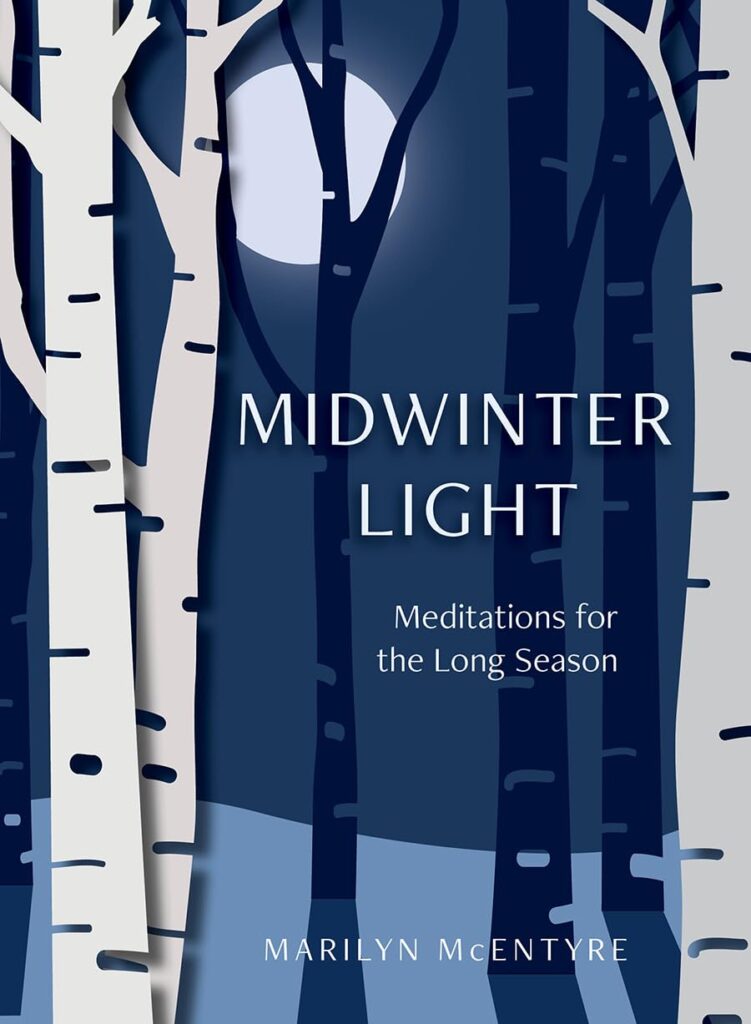When you take a midwinter flight there’s a good likelihood you’re going to see some stars. Days just don’t have a lot of daylight. Travel during the darkest time of the year can be as mentally, emotionally and spiritually dark as it is literally dark. It can however be just the ticket to a place where you can see and experience midwinter light. Yes, that light could be from the sun if you travel far enough – to the hemisphere in the opposite latitude! But midwinter light is really about having a lifestyle of seeing with the brightness of God’s goodness and grace especially in the midst of darkness.
The first chapter of Genesis in the Bible tells of God’s incredible creative power. From the beginning, earth, this place we get to explore is described as “inky blackness”. “Then, God spoke: ‘Light’ And light appeared.” Typically a travel lifestyle is built around the many experiences done in the light of daytime. Winter travel is different. When you get out and about either away or around your home during this time of year, you’re going to experience life in the dark. The book, Midwinter Light – Meditation for the Long Season, by Marilyn McEntyre is a collection of reflections on winter poems that can help illuminate your spirit as you go through winter’s darkness.
READING THAT TAKES YOUR MINDSET TO A BRIGHTER PLACE

This is the book to pack in your carry-on and take with you on your next flight. It’s small and compact and gives you plenty of short readings to ponder as you travel during winter.
This book is ideal for the traveler. Several of the poems are by authors from around the world: England, California, Ohio, Texas, Japan, the Southwest United States, Celtic Europe, New England, and in the selection from the book below, Arctic Canada. The poems and McEntyre’s reflections together are uniquely crafted readings to serve as a spiritual airplane and lift your spirit in the midst of darkness.
McEntyre shares in the book’s introduction that she sees the poems as, “simply a record of one poet’s attentiveness to gifts that come in the ‘dark time of the year’. She encourages readers to use the book to reflect, be inspired, pray and discover glimmerings of midwinter light.
FIND GOD AS YOU GO IN THE DARK
I have found that getting out in the dark – in the winter is at the very least invigorating. The colder temperatures, clear sky and the particularly-quiet quietness are all conducive to focusing on God. In fact when you allow yourself to more earnestly seek God’s Spirit, the lack of busy activities – things you can do during daylight, becomes a powerful catalyst to putting your mind on the things of Christ. This is the season when the eyes of your heart can dilate more fully and see things like peace, hopefulness, potential, opportunities and so many other things of God more clearly.
Instead of doubling down on your temperature-controlled indoor well-lit workspace with technology that never stops and ceaselessly connects you to hustle and a ‘productive’ agenda, you need to get out and go find the midwinter light. It is the glimmer of refreshment you need to find God’s healing, restoration and direction. It’s the twinkling star that becomes a fireball of His WHAT’S NEXT! for you.
BOOK SELECTION 1
(Tap the “+” below to expand/close the selection for reading.)
Our Common Home
Selections from MIDWINTER LIGHT Meditations for the Long Season, Copyright 2024 Marilyn McEntyre. Published by Broadleaf Books an imprint of Augsburg Fortress Publishers. Reprinted with permission.
Let yourself be blessed. These words came to me, forcibly and almost audibly, in a particular moment of prayer years ago and have helped me stop my striving from time to time and open myself to blessing the way you open a curtain and light comes in. The curtain part is up to me.
There are other versions of this (I think divine) instruction: Let yourself be held. Let yourself be touched. Let yourself be changed. The words of Uvavnuk, Ingloolik Inuit shaman, touch me. They bless me. Because she has let herself be blessed, awakened, stirred, set adrift, cleansed, and carried. The wisdom she imparts, it seems, is simply a testimony to what has happened to her: she has opened herself and been changed. Allowing herself to be moved by the sway of the sea, the spaciousness of the sky, the wind, she discovers a kind of joy that can’t, finally, be imparted, but only acknowledged with gratitude. Like heated glass, the forces that move through the grateful body are spun into words, translucent and inviting. This happened to me—a message whose other side is “This could happen to you.” There are no imperatives here—only what Heschel called “radical amazement” at the deep simplicity of transformation.
And why are her words rendered as a poem—two spare stanzas? It may be a translator’s choice, but if so, it’s a good one. Each line ends at its own stopping point. We can rest there, taking the measure of how such things happen: how one may be stirred by the great sea—by its greatness, and by whatever in one’s own body moves with its waves and deep currents. How one may recognize something of one’s own life in the weed, tugged and held on stone, in water. How wind moves through our lungs, through the open spaces of the expectant heart, and lifts us into a new state—an altered state for which we have only the small word “joy.”
The Inuit live in winter places. What they see around them is large. The light they live with comes and goes in long stretches—days and nights that might seem endless and daunting to us who live in more temperate latitudes. But perhaps their adaptation to long rhythms and more dramatic changes schools them in a habit of acceptance that prepares them for joy. When it comes in the morning, after a long, long night, making the wide sea visible once again, it fills the body and moves the “inner parts.”
It matters to hear how those from other cultures than our own speak of joy—or sorrow or pain or healing. They can teach us more than we could know on our own about how to open our eyes and spirits wider to the gift of life on this earth, our common home.
Listening to this short poem by Uvavnuk. It accompanies the above reflections, Our Common Home, by Marilyn McEntyre.
CULTIVATE A POSITIVE “WINTERTIME MINDSET”
Not everybody dreads the winter darkness as much as I do. In fact those who don’t typically live a healthier, more peaceful, longer – a better life. Kari Leiboweitz, PhD, traveled to and lived for a year in Tromsø, Norway (blueish skyline picture below), “a place so far above the Arctic Circle that the sun doesn’t rise from November to January.”
She did research that ultimately led to publishing the book, How To Winter: Harness Your Mindset to Thrive on Cold, Dark, or Difficult days. She shares on her website that it, “is a blend of mindset science, original research, and cultural insights for cultivating a positive ‘wintertime mindset,’ to vanquish winter blues and find joy and comfort in dark times year-round.
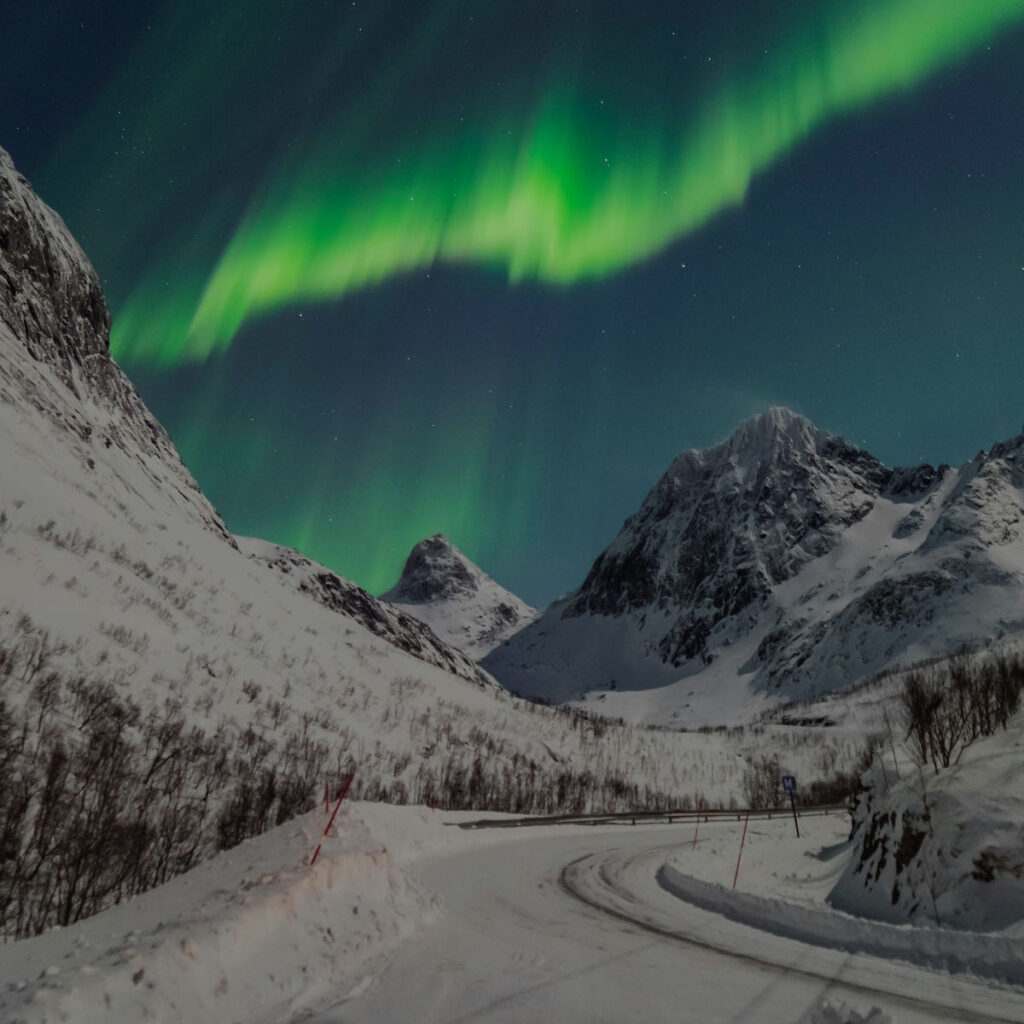
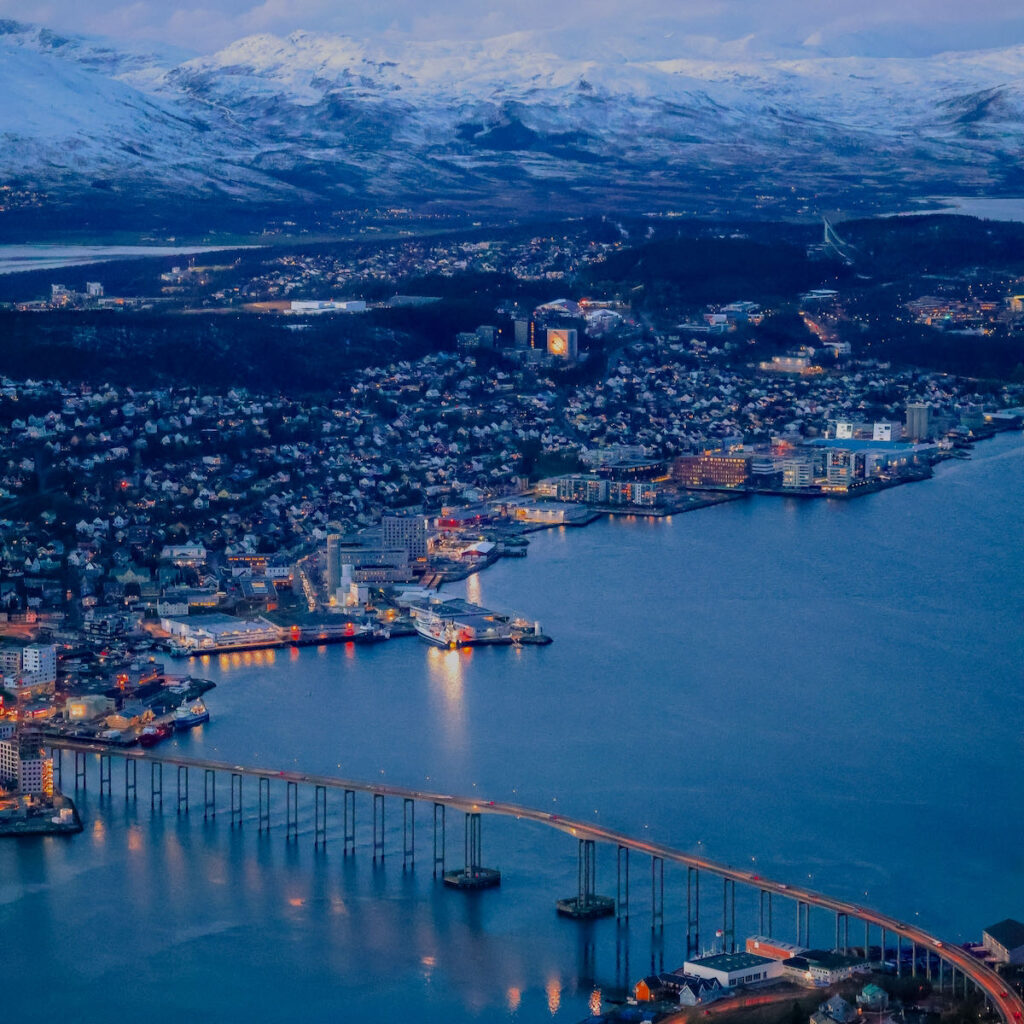
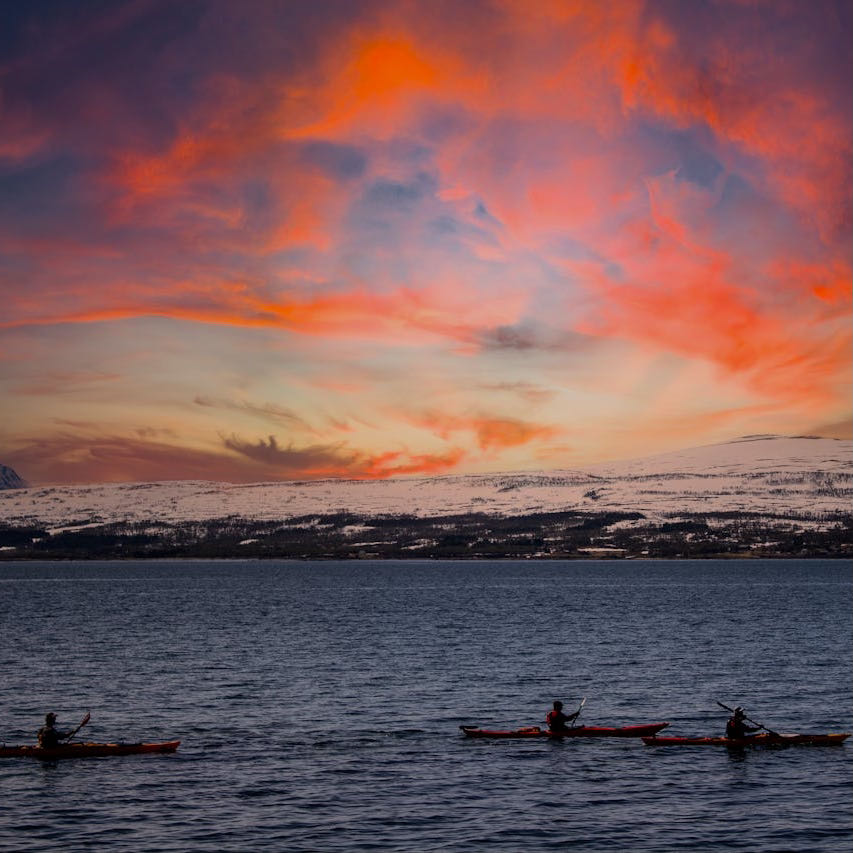
(Photos of Tromsø, Norway region free license to use from Pexels.com)
About her research she explains:
There are many reasons why wintertime mindset might be more positive in northern Norway than elsewhere. Besides having some of the most breathtaking natural landscapes in the world and being home to stunning displays of the Aurora Borealis (greenish aurora picture above), spending time outdoors in all seasons is an important part of Norwegian culture. This culture, which includes an appreciation for winter recreation (reddish kayak picture above) such as cross-country skiing, may be particularly conducive to a positive wintertime mindset. By looking to Norway as an example of a place that does winter well, we hoped to extrapolate insights that could be used to promote wintertime flourishing worldwide. By identifying wintertime mindset as an important factor influencing wellbeing for residents of northern Norway, we have uncovered a psychological approach to winter that may be exported from Norway to improve winter wellbeing elsewhere. To examine whether the relationship between wintertime mindset and wellbeing is unique to Norway, cross-cultural studies on wintertime mindset should be conducted.
Cultivating a positive winter mindset can clearly make a big difference in the lives of people. It’s important however to realize that (a key insight to get from this article) real and lasting ‘positivity’ comes from God alone. We can and should think on things that are the best, the beautiful and the most praise worthy BUT it is God who is the one who gives us peace when we do that.
BOOK SELECTION 2
(Tap the “+” below to expand/close the selection for reading.)
Gratitude After All
Selections from MIDWINTER LIGHT Meditations for the Long Season, Copyright 2024 Marilyn McEntyre. Published by Broadleaf Books an imprint of Augsburg Fortress Publishers. Reprinted with permission.
The lovely, poignant phrase that ends this poem has been a gift to me, as it has to several generations of readers who have found themselves, as they pause over the final line, remembering how little they, too, understood, as self-interested adolescents, “love’s austere and lonely offices.” The way confession and gratitude converge here rings true. Much of our gratitude is belated. The moments of reframing that come in occasional retrospection often come by means of very specific memories. For the speaker in this poem, it is the memory of his father lighting the fire on winter mornings. Not a memory of the fire’s warmth, or of the comfort it gave, but of what it cost the man with cracked and aching hands who rose into “blueblack cold” to light it.
The tribute the poem offers to a father’s fidelities is not uncomplicated. Only one line acknowledges how the speaker (and, as we know, the poet) feared “the chronic angers of that house,” but it sets the context for a story, largely untold, of how love survives. Trauma, abuse, neglect, harsh words, or chill silences can sometimes snuff it out, but remarkably often it flickers back into life in healing reflection. Compassion itself is austere; it can grow from the smallest moments of remembering, ignited sometimes by a single image—a cracked hand or polished shoes.
Hayden himself grew up poor and often in pain from the confusion of parents’ hostilities and foster parents’ stop-gap care. Detroit in wintertime must have been then, as it must still be now, a harsh place to be poor. Adequate heat is a luxury to be meted out sparingly by those whose hours of poorly paid labor doubles the price they pay for it. Winter brings many of us to its own terms with the cost of living. I think of Emily Dickinson’s unsettling description of the deadening numbness of cold in her poem about what it is to live with the irremediable fact of pain: “First—Chill—then Stupor—then the letting go –.” It doesn’t take much, according to those who report having been very near death by cold, to reach that tipping point where the body simply stops trying to warm itself. It takes a great deal, on the other hand, to keep the fire in the hearth, the fire in the body, the fire in the spirit burning in the dead of winter. That familiar phrase reminds us that death comes a little closer in wintertime and is more visible.
The speaker in this poem knows that chill and knows now what kept him alive in the dead of winter. The harshness of his father’s task is mirrored in the “splintering” and “breaking,” probably of wood, though in the poem it is the cold itself that is broken, giving the father’s lifegiving work a mythic dimension. Only now can he remember those winters with gratitude. The gratitude is laced with regret: “No one ever thanked him.”
He invites readers to personal reflection, whatever their winter morning may have been: Who got you through the winter? Who kept you warm? Whose work gave you rest? Who attended to your small needs—or your large ones—in the most challenging seasons? What austere and lonely offices must someone have performed on your behalf? It’s good for all of us to take the measure of what has been provided, best if we do it in reviewing the concrete particulars of our own winter mornings and in small reminders like the smell of freshly polished shoes.
FIND YOUR MIDWINTER LIGHT
So, go! Go to Norway or some other international destination and do your own cross-cultural studies on wintertime mindset. Get on a flight into the darkness a little closer to the stars. Experience an appreciation of winter recreation, incredible landscapes and people who do winter well. OR
Go to Detroit or some other place where people are working in the harshness of winter to bring lifegiving hope to others who may not appreciate it yet. Labor alongside them as an act of gratitude – not just to them but to God. OR
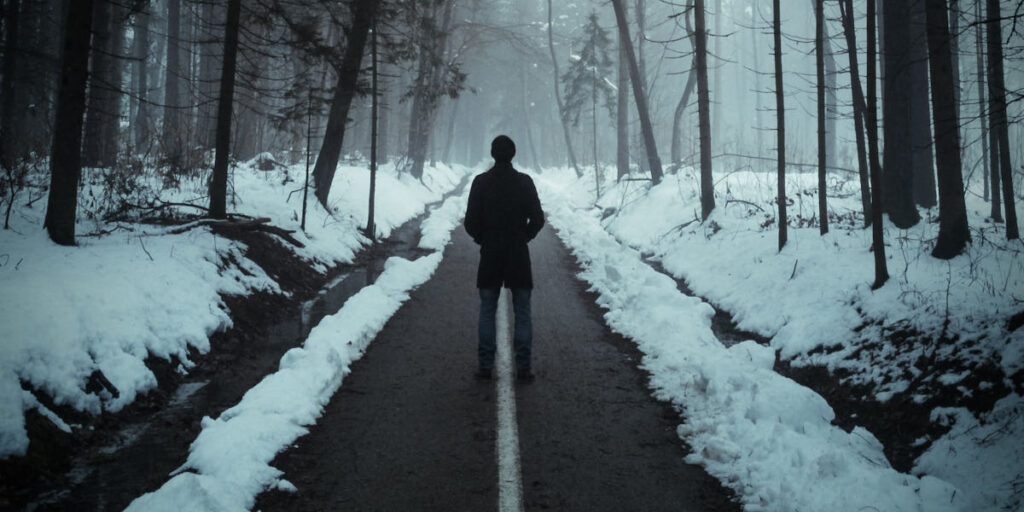
Go on a winter getaway and take a walk all alone on a deserted bike trail. Listen closely for God and look for the midwinter light that Jesus Christ wants to shine into your life. What you hear and what you see can put you in a place where we all long to be – in the simple but secure presence of God. That can transform your travel and everything you know about the light.




